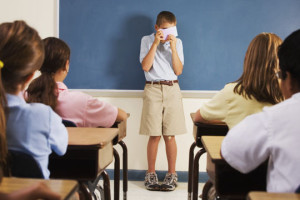Parenting is an adventure of highs and lows, joys and frustrations, and many, MANY questions along the way. One of the things I often have trouble with is dealing with my daughter’s anxiety. I noticed that my daughter from a very young age was “different.” She would become fussy in the midst of strangers, overcrowded rooms, and new places. As she became a toddler, she became defiant, threw countless tantrums when things didn’t go her way, and became unusally shy around adults. I often wondered if she could be autistic due to not only her social anxiety and tantrums, but trouble with all transitions (such as potty-training and the birth of her brother), and her need for perfection. I made sure to follow a strict routine hoping it would help. It was not until my daughter started school that I realized she probably has a bit of an anxiety issue.
Since I knew my daughter had trouble adjusting, I grew anxious as soon as my daughter turned three, knowing she would start kindergarten soon. To help with her being away from me, I enrolled my daughter in ballet lessons. She loved to dance so I thought she might as well get used to being away from me, while she did something she loved. As my mom and I bought her ballet attire and ballet shoes, my daughter grew excited, and I actually thought I had nothing to worry about.
On the first day of ballet, my daughter went in the class, and came back out a few minutes later crying, even though my mom, her father, and I could see her and she could see all of us from the class window. The second week it was just me and her and she also came out of class crying. The third week she came out and went back in. The fourth, fifth, and sixth weeks, she stayed in class but refused to participate and sat in a corner despite the teachers’ many attempts. I was mortified but I was determined to show my daughter that quitting wasn’t an option and that she had to face her fears eventually. The seventh and last class of the semester, was the first time she participated, and both the teachers and parents were amazed at how much she had observed and picked up. Currently my daughter is four, and participates enthusiastically UNLESS she has a substitute teacher or has to do a make-up lesson with a class or teacher other than her own. Then, things fall apart very fast; there is panic, tears, and minimal participation.
My daughter reacted to kindergarten much the same way. She initially didn’t want to go to school but was quite excited on the first day. I was surprised that she went inside but expected a phone call saying that my child was inconsobably crying and I needed to come get her. I kid you not, my dad and I waited by the phone for a phonecall that never came. My daughter didn’t have a problem with school until the week after when her class started going to the gym and the library. The change of schedule threw her off and I had to drag her to school every single day for almost a month kicking and screaming about how she hates gym and library. What’s her favourite subject now? Gym!
The anxiety about having to leave her classroom for gym and library plus other triggers, was enough to cause my daughter’s asthmatic symptoms to spiral out of control, to the point where she has missed so many school days. If it wasn’t asthma, it was stomachaches. We have been really lucky because my daughter’s teachers’ have been so patient and understanding with her and as a result my daughter is thriving. Instead of having fallen behind in school, she is well ahead of her class. I have been very lucky in that I have met some very supportive people as well. The other moms and dads at my daughter’s ballet class have provided such encouraging words as they have witnessed me struggle with my daughter’s anxiety. I continue to be hopeful as I encourage my daughter to take healthy risks and as I help my daughter ease her anxiety.
Dealing with a child’s anxiety is not easy, but there are many ways that you can help your child.
Children often experience healthy levels of anxiety from when they are born, and sometimes it is easy to spot anxiety such as through cries, and sometimes it is more difficult such as when anxiety presents itself through tantrums and defiant behaviour.
Anxiety disorders are often inherited, and other times can be brought on by events such as:
the birth of a sibling, moving, starting school, parental conflict, domestic violence, having nervous parents, death of a close family member, medicial issue (illness or injury of the child or loved one), etc.
The following are some signs of children with unhealthy levels of anxiety:
- Inflexibility
- Separation anxiety
- Sleeping disturbances (trouble falling asleep, night terrors)
- Poor memory and concentration
- Unhealthy eating patterns
- Crying
- Perfectionism
- Constant stomach-aches or other physical ailments
- Excessive worrying
- Negative thinking
- Avoiding unfamiliar people and places
The following are some signs of children with social anxiety:
- not speaking in social situations
- fearful of asking questions in class
- lack of participation in school
- having few or no friends
- refusing to answer the phone
- refusing to speak to adults other than adults that are an immediate part of the family
- trouble eating in front of others
- not wanting to visit or attend birthday parties or other events

What Can You Do to Help Your Child
Anxious children can be demanding and emotional and cause you to loose your patience at times. As a mom who has dealt with many episodes of anxious behaviour, I can tell you that if you become anxious or stressed as a result of your child’s anxiety, your child will pick up on it and it will heighten their level of anxiety. Here are some things that I have been doing with my daughter, that has proven some success. These suggestions won’t work right away but it will definitely help your child cope with his or her anxiety.
- Establish a daily routine, inlcuding a relaxing bedtime routine
- Allow your child to get plenty of exercise
- Set limits and stick to them
- Be consistent in your parenting
- Talk about your child’s feelings
- Soothe your anxious child through words, hugs, cuddling, talking, reading, no matter how old
- Teach your child coping mechanisms such as taking deep breaths or counting to ten
- Help your child find calming activities to do such as painting
- Encourage your child to take risks
- Remind your child of fears that he or she has overcome
- Help your child express her anxities and fears in words
- Accept your child’s anxieties and fears, and then…
- Allow your child to approach new situations or feared situations in small steps
- Praise and reward your child for taking steps to face his or her fears
- Be a good example by being calm
Conclusion
Parenting my daughter and knowing what to do when, has been a difficult process for me mostly because I didn’t understand what she was going through. Although my daughter could have inherited the anxious temperament, I believe she mimicked or at the very least learned it from me as well. My daughter from birth had a lot to adjust to and witnessed me anxious and stressed as I struggled to juggle the roles of a new wife, new mother, full-time student, and tutor. Now I have slowed down a lot and adopted a more calmer lifestyle, hoping my daughter re-learns from my example how to manage stress and anxiety.
The best thing you can do for your anxious child is to offer support and provide stability.
It is important to note that anxiety is common in children, especially those living a fast-paced lifestyle. If you believe that your child’s anxiety is affecting your child’s ability to enjoy life, it is best to speak with your child’s doctor and address any concerns you may have regarding your child.
Suggested Reading:
Click here to read about anxiety in children.
Click here to read about social anxiety in children.
Click here to read about how to handle anxiety in children.
Feature Image: prescenceoffear.com





Your style is unique compared to other folks I’ve read stuff
from. Thanks for posting when you have the opportunity,
Guess I will just book mark this blog.
Thank you!
I truly love your blog.. Pleasant colors & theme. Did you build this site yourself?
Please reply back as I’m attempting to create my very own blog and want to find out
where you got this from or jusst what the theme is called.
Kudos!
My web blog … estate agents in Brookmans Park (storify.com)
Thank you. I actually bought hosting from godaddy. The theme is called Chocolat.
313576 540568Your home is valueble for me. Thanks!? This web page is truly a walk-via for all of the info you needed about this and didn know who to ask. Glimpse correct here, and you l certainly uncover it. 222129
488016 592948This design is steller! You most definitely know how to keep a reader entertained. Between your wit and your design, I was almost moved to start my own blog (almost)
536450 863294A thoughtful insight and concepts I will use on my weblog. Youve naturally spent a great deal of time on this. Thank you! 521548
[…] If you have a child that experiences anxiety, please read Anxiety in Children & How Parents Can Help. […]